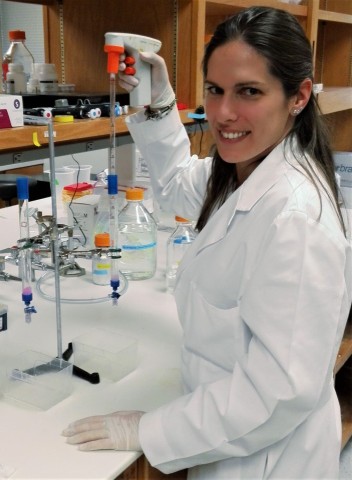Special Focus: Different career paths of the MSCA fellows - From an MSCA Global Fellowship to a COFUND Fellowship
Newsletter
MCAA Board member Corinne Portioli investigates drug discovery, structural biology, and nanomedicine applied to neurodisorders. She tells us how holding first an MSCA Global Fellowship and now an MSCA COFUND Fellowship has been shaping her career.

Being one of the few researchers that have had multiple MSCA fellowships is an honor and a privilege. I first held an MSCA Global Fellowship at the Brain Development and Disease Lab of the Italian Institute of Technology (IIT) and the Biochemistry and Molecular Biology Lab of the Baylor College of Medicine (BCM) in Houston, US (Grant agreement No 843239). Currently, I am an MSCA COFUND Fellow at the Nanotechnology for Precision Medicine Lab of IIT (Grant agreement No 754490). I consider this as a pivotal and prestigious mid-term career achievement, which will pave the road to becoming an independent researcher.
After receiving an MSc in Biotechnology, my career has always been focused on the study of the brain. During my BSc thesis at the University of Modena and Reggio Emilia, I worked on a neuropharmacology project. Since I have always been attracted by new challenges, for my MSc thesis I decided to explore the molecular modeling and drug design field of research. Although I ascertained the importance of the two areas, my preference was wet-lab research. I collaborated for a short time with a biotech company to find novel inhibitors for neurodegenerative disorders, before enrolling in a PhD in Neuroscience at the University of Verona (Italy), where I investigated the use of nanoparticles as innovative systems for the brain drug delivery. During that time, I also spent six months in a leading nanomedicine lab in Manchester (UK). It was very exciting (apart from the rainy weather!), and it gave me the opportunity to interact with a multicultural environment, and to approach different ways of lab work and research.

In 2017, I realized that it was time to move forward and embrace new challenges, so I moved to IIT for a postdoc. The excellent institution and the job description was reflecting, to me, the perfect match with all my experiences and the skills I had acquired. Moreover, a collaboration with an institution in the US was required, and this was another aspect that thrilled me. I joined Laura Cancedda’s lab supported by a Telethon grant, to work at finding new therapies for Down syndrome. Then, I successfully applied for an MSCA-GF, which started in July 2019. The project led me to adopt an interdisciplinary approach to investigate the mechanism of a membrane transporter, in collaboration with Marco De Vivo at IIT and Ming Zhou Lab at the BCM. Thanks to the leading experience of my supervisors and lab members, I learnt cutting-edge methodologies that could be applied to a wide variety of projects in the future. The possibility to be trained on techniques at the forefront of structural biology has been an invaluable opportunity to expand the network and improve the knowledge.
Experiencing multicultural, diverse and interdisciplinary work environments, widening the global network and developing strong adaptation and collaborative skills in managing new projects, are all invaluable aspects of this overseas experience. Moving into one of the biggest cities in the US was tough at the beginning: leaving the routine life, the work environment and the hobbies to tread alone in an unknown life chapter was probably my main concern at the time. After the first months of acclimation (and hurricane Harvey), I started to meet new people becoming part of the local Italian community, I enrolled in a Spanish course (the second main spoken language in Texas), and I started to attend the main events in town, such as the Rodeo, or the NBA. Mexico’s cultural influence is pervasive in Texas: there was never a shortage of tacos, fajitas and tequila, although Italian cuisine was always much appreciated. The weather was hot, humid during summer and mild in winter. I loved it. I come from a town close to the river Po, so I am more used to humidity. The unpredicted COVID-19 pandemic hit during the last months of my stay in the US. Besides the very hard time and the unforeseen circumstances, the lockdown was an opportunity to improve remote working, connect with our network, and slow down a bit our life speed, thinking more.
In July 2020, I moved back to Italy, knowing that Houston would have always been my second “home”. After spending one year at the IIT for the mandatory incoming phase in the EU hosting institution, I moved to the next (and still current) step of my journey. I read about an open position for an MSCA COFUND programme, called MINDED in the IIT newsletter. I was curious about the topic of advancing the diagnosis, imaging and treatment of neurodevelopmental disorders (NDDs). After verifying that I was eligible, I applied and joined the Nanotechnology for Precision Medicine Lab led by Paolo Decuzzi. The goal of the study is to develop drug delivery systems in NDDs, which are characterized by brain function deficits that usually show up early in children, and can affect memory, learning ability, socialization and self-control, with social and economic impacts. MINDED uses a multiscale and novel approach: neuroscience investigates the causes of NDDs, identifying biological targets for new and more effective therapies, nanomedicine develops devices for the precise and patient-specific delivery of novel therapeutic and diagnostic drugs and contrast agents, and robotics improves the early detection. As a MINDED fellow, I also benefit from a specific training for business development and clinical translation of new biomedical technologies.
I thought on my career journey as a pharmaceutical biotechnologist and a neuroscientist, and I realized that my driven theme has always been about finding new and innovative cures for brain disorders, because the brain has such a crucial and complicated role that makes each aspect of the research a fascinating puzzle piece. The MSCA programme has been playing a crucial role in advancing and shaping my scientific career. Besides the differences between the two MSCA fellowships, one key parameter is the mobility (international and intersectoral). Living in different countries and environments enriched me as a researcher both in terms of work opportunities and network and in terms of personal experiences in being embedded in different routines, cultures and habits. I bet that friends and colleagues one day perhaps will leave for new places too, but no borders will limit networks and challenges.

Corinne Portioli
Italian Institute of Technology, Genoa (Italy)
MCAA Board member
corinne.portioli@mariecuriealumni.eu
Twitter: @corinneportioli